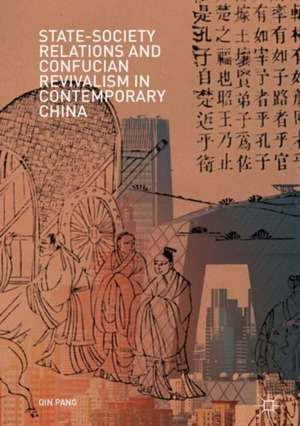State-Society Relations and Confucian Revivalism in Contemporary China
Autor Qin Pangen Limba Engleză Hardback – 6 iun 2018
This book is a study of the causes of the Confucian revival and the party-state’s response in China today. It concentrates on the interactions between state and society, and the implications for the Chinese state’s control over society, or in other words, its survival over a rapidly modernizing society. The book explores the answers to questions such as: Why has Confucianism suddenly gathered great momentum in contemporary Chinese society? What is the role of the Chinese state in its rise? Is the state really the orchestrator of the Confucian revival as has been widely assumed? This book will be of interest to think-tank and policy researchers, sinologists, and those with an interest in Chinese society.
Toate formatele și edițiile
| Toate formatele și edițiile | Preț | Express |
|---|---|---|
| Paperback (1) | 719.54 lei 43-57 zile | |
| Springer Nature Singapore – 21 dec 2018 | 719.54 lei 43-57 zile | |
| Hardback (1) | 724.77 lei 43-57 zile | |
| Springer Nature Singapore – 6 iun 2018 | 724.77 lei 43-57 zile |
Preț: 724.77 lei
Preț vechi: 883.87 lei
-18% Nou
Puncte Express: 1087
Preț estimativ în valută:
138.73€ • 150.74$ • 116.61£
138.73€ • 150.74$ • 116.61£
Carte tipărită la comandă
Livrare economică 21 aprilie-05 mai
Preluare comenzi: 021 569.72.76
Specificații
ISBN-13: 9789811083112
ISBN-10: 9811083118
Pagini: 268
Ilustrații: XIX, 287 p. 13 illus.
Dimensiuni: 148 x 210 x 26 mm
Greutate: 0.52 kg
Ediția:1st ed. 2019
Editura: Springer Nature Singapore
Colecția Palgrave Macmillan
Locul publicării:Singapore, Singapore
ISBN-10: 9811083118
Pagini: 268
Ilustrații: XIX, 287 p. 13 illus.
Dimensiuni: 148 x 210 x 26 mm
Greutate: 0.52 kg
Ediția:1st ed. 2019
Editura: Springer Nature Singapore
Colecția Palgrave Macmillan
Locul publicării:Singapore, Singapore
Cuprins
1. Introduction.- 2. China's Mutually Empowering State and Society Relations.- 3. The Chinese State's Decentralized Response Towards the Confucian Revival and Its Institutional Base.- 4. The Confucian Revival among Intellectuals and the State Responses.- 5. Confucianism with Consent: The Revival of "Confucian Entrepreneur" and the Chinese State's Responses.- 6. Attenuation, Appropriation, and Adaptation: The Confucian Revival Among the Urban Middle Class and the Chinese State's Responses.- 7. Conclusions.
Recenzii
“The book is an in-depth study, which provides new insights into the decentralization of Chinese political institutions. Pang makes a crucial contribution to the study of the diversified ideologies and beliefs generated in a modernizing context.” (Mei Yang, Religious Studies Review, Vol. 45 (3), September, 2019)
Notă biografică
Qin Pang is an associate Professor in Sun Yat-Sen University, Guangzhou, PRC. Her works have been widely published in Journal of Contemporary Asia, China: An International Journal, World Economy and Politics, and Contemporary Asia-Pacific.
Textul de pe ultima copertă
This book is a study of the causes of the Confucian revival and the party-state’s response in China today. It concentrates on the interactions between state and society, and the implications for the Chinese state’s control over society, or in other words, its survival over a rapidly modernizing society. The book explores the answers to questions such as: Why has Confucianism suddenly gathered great momentum in contemporary Chinese society? What is the role of the Chinese state in its rise? Is the state really the orchestrator of the Confucian revival as has been widely assumed? This book will be of interest to think-tank and policy researchers, sinologists, and those with an interest in Chinese society.
Qin Pang is an associate Professor in Sun Yat-Sen University, Guangzhou, China. Her works have been widely published in Journal of Contemporary Asia, China: An International Journal, World Economy and Politics, and Contemporary Asia-Pacific.
Caracteristici
Seeks to analyze the rise of neo-confucian values in China Describes the rise of civil society in post-reform China Explores how Confucian values play out in governmentality and business in contemporary China
